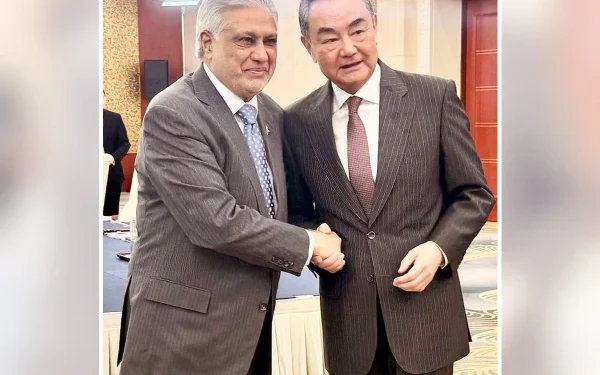Tianjin, China:In a significant diplomatic engagement aimed at enhancing strategic and economic cooperation, Pakistan’s Deputy Prime Minister and Foreign Minister Senator Muhammad Ishaq Dar held a crucial meeting with Chinese Foreign Minister Wang Yi on the sidelines of the Shanghai Cooperation Organization (SCO) Council of Foreign Ministers summit in Tianjin, China.
The high-level bilateral meeting focused on strengthening the China-Pakistan Economic Corridor (CPEC), boosting regional peace and stability, and enhancing multilateral collaboration under the SCO framework. The two sides reiterated their commitment to the All-Weather Strategic Cooperative Partnership, a term long used to describe the strong, time-tested bond between Islamabad and Beijing.
Warm Welcome and Diplomatic Courtesy
At the outset of the meeting, Foreign Minister Ishaq Dar extended warm congratulations to the Chinese government on the successful hosting of the SCO Ministerial Conference. He praised China’s efforts in ensuring smooth conduct and effective management of the summit, which brought together key players from Eurasia, South Asia, and Central Asia.
Dar also expressed gratitude for the hospitality extended by the Chinese leadership, emphasizing Pakistan’s appreciation for its longstanding friendship and support from China in bilateral and multilateral forums.
Focus on CPEC: A Cornerstone of Bilateral Cooperation
One of the core areas of discussion was the China-Pakistan Economic Corridor (CPEC), a flagship project under China’s Belt and Road Initiative (BRI). The $62 billion infrastructure and connectivity program has transformed Pakistan’s economic and energy landscape since its inception in 2015.
✅ Key Areas of CPEC Cooperation Highlighted:
- Ongoing infrastructure development, including roads, railways, and energy projects
- Special Economic Zones (SEZs) aimed at industrial growth and job creation
- Upgradation of Gwadar Port, enhancing regional trade and maritime connectivity
- People-to-people exchanges to boost cultural understanding and academic collaboration
Both sides expressed satisfaction over progress made in Phase II of CPEC, which focuses on industrialization, socio-economic development, and agricultural cooperation. Dar reaffirmed Pakistan’s unwavering commitment to ensuring the timely completion and security of all CPEC projects.
CPEC’s Strategic Importance in the Region
During the conversation, Foreign Minister Wang Yi underscored that CPEC is not just an economic initiative but a symbol of regional integration and shared prosperity. He reaffirmed China’s commitment to CPEC as a flagship BRI project, which contributes significantly to regional development and cross-border connectivity.
Ishaq Dar noted that CPEC has already created thousands of jobs, helped in resolving Pakistan’s energy crisis, and laid the groundwork for sustainable economic growth.
The two foreign ministers agreed that CPEC’s expansion into Afghanistan and Central Asia could bring immense economic opportunities and foster regional peace and connectivity.
Reaffirmation of Strategic Partnership and Mutual Trust
The meeting reaffirmed the depth and resilience of the Pakistan-China relationship, which has remained stable and strong across decades, irrespective of changes in regional or global dynamics. The leaders referred to the bilateral ties as an “All-Weather Strategic Cooperative Partnership” — a term coined to describe the robust, dependable, and long-standing cooperation between the two countries.
🛡️ Strategic Cooperation Areas Discussed:
- Counterterrorism coordination and regional security
- Military exchanges and defense collaboration
- Support in multilateral forums including the United Nations and SCO
- Close consultation on Afghanistan and Indo-Pacific developments
Wang Yi reiterated that China views Pakistan as a trusted friend and partner, particularly in navigating global uncertainties. He also appreciated Islamabad’s firm support for China’s core interests, including the One China Policy.
Multilateral Cooperation Under the SCO Umbrella
The foreign ministers discussed various initiatives under the Shanghai Cooperation Organization, which both countries view as a vital platform for regional security, anti-terrorism collaboration, and economic integration. As founding members and active contributors, Pakistan and China emphasized the need for closer coordination within the SCO framework.
Foreign Minister Dar emphasized Pakistan’s commitment to the SCO Charter, and its role in enhancing connectivity, economic cooperation, and people-to-people interaction among member states.
Both sides also welcomed newly launched joint initiatives within SCO on climate action, digital infrastructure, and anti-drug operations.
Commitment to Regional Peace and Stability
A major theme of the meeting was the shared vision for a peaceful and prosperous South and Central Asia. Ishaq Dar and Wang Yi underscored that peace in Afghanistan, counter-terrorism efforts, and economic resilience are essential for lasting regional stability.
They called for:
- Peaceful resolution of conflicts through dialogue and diplomacy
- Respect for sovereignty and territorial integrity
- Enhanced role of regional institutions like SCO in peacebuilding
- Development-led approaches to curbing extremism and poverty
The ministers agreed to continue joint efforts to combat terrorism, enhance border security cooperation, and facilitate regional trade corridors.
Economic, Technological, and Cultural Cooperation
Beyond infrastructure and security, the two leaders discussed ways to deepen economic and technological cooperation, including:
- Expansion of bilateral trade, currently valued at over $25 billion annually
- Joint ventures in renewable energy, AI, e-commerce, and agriculture
- Scholarship programs for Pakistani students in Chinese universities
- Media, film, and cultural exchanges to promote people-to-people understanding
Foreign Minister Dar appreciated China’s support for Pakistan’s digitalization and education reforms, especially in less developed areas like Gilgit-Baltistan and Balochistan under CPEC’s social sector initiatives.
Looking Ahead: A Shared Vision for the Future
Both sides emphasized the need to translate strategic trust into tangible outcomes for the benefit of their people. The meeting concluded with a mutual agreement to:
- Continue high-level exchanges and dialogues
- Accelerate joint project implementation under CPEC Phase II
- Coordinate positions on global platforms
- Promote a peaceful, multipolar, and interconnected world order
Conclusion: A Milestone in Pakistan-China Relations
The meeting between Foreign Minister Ishaq Dar and his Chinese counterpart Wang Yi served as a milestone in reinforcing bilateral ties, promoting regional harmony, and charting the course for future cooperation in diverse fields. As CPEC evolves and global geopolitics shift, the Pakistan-China relationship remains a pillar of regional diplomacy and economic transformation.

























